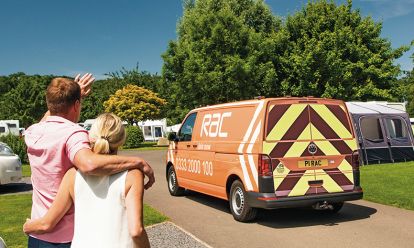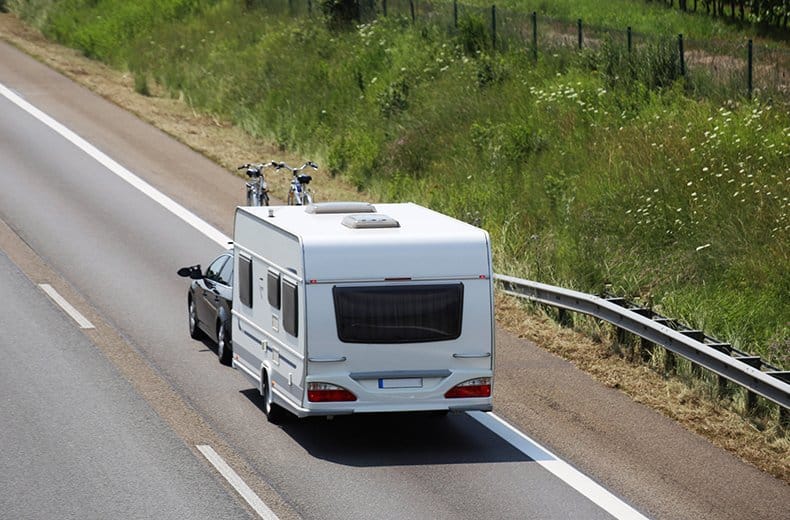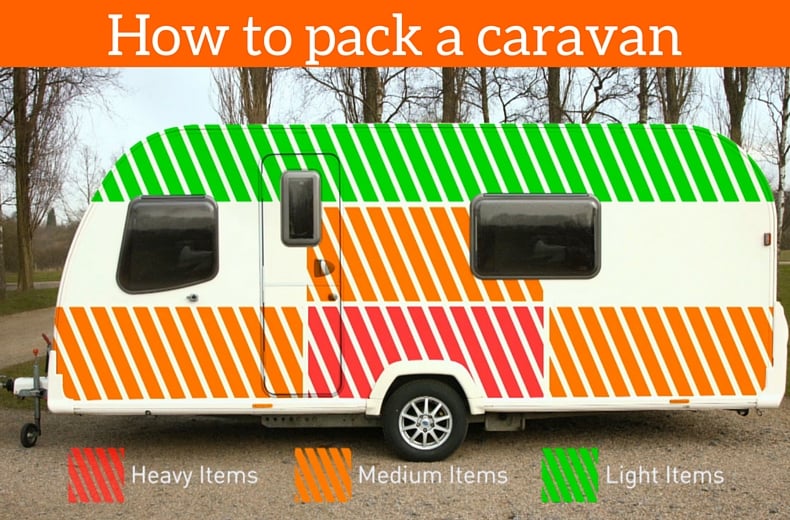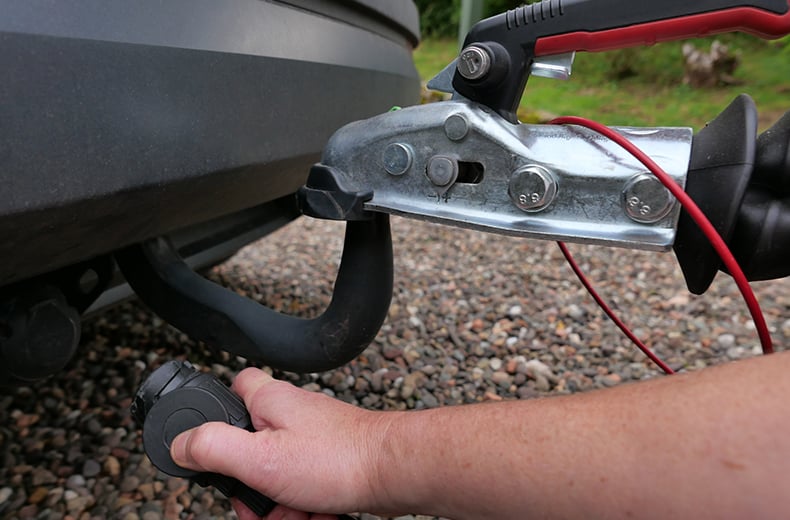With help from RAC patrols and our partners The Camping and Caravanning Club, we’ve put together everything a driver should know before hitting the road.
Here's a quick reference list which you can check off if you print this page. We go into more detail below.
| Check | Done? |
|---|---|
| Check and secure towbar | |
| Check wheels and tyres for wear | |
| Top up tyre pressure | |
| Test brakes | |
| Check lights | |
| Check suspension sits level | |
| Check mirrors/fit extension mirrors | |
| Check number plate matches towing car | |
| Clean coupling | |
| Check hitch and towball for wear | |
| Check gas taps are off | |
| Isolate the mains electric | |
| Set the fridge to 12V mode | |
| Disconnect mains cables and stow away | |
| Clean electrics connector pins and sockets | |
| Drain the water system | |
| Disconnect and stow water pump | |
| Empty and drain to toilet flush tank | |
| Check insurance, MOT and breakdown cover |
Initial caravan and motorhome checks
Start with the essentials:
Towbar
The connection between your car and caravan has to be secure. Make sure of this by keeping the towbar well maintained and properly fitted. Look for any rust or cracks and tighten any loose bolts.
If you’re unsure, don’t set off without talking to the Club’s Technical Help Desk.
Wheels and tyres
Wheels and tyres are fundamental to road safety so carry out a visual check for any cuts, cracks, bulges or nails over the whole tread area and sidewall.
The legal minimum tread depth is 1.6mm (as it is for cars), but more often than not caravan, motorhome and trailer tyres need to be replaced because of deterioration due to age rather than tread wear.
If your unit hasn’t been moved for some time the tyres may have developed flat spots and could need replacing.
Correct tyre pressures are vital so use a good quality pressure gauge to check them.
Your handbook will indicate the recommended tyre pressures, but if the tyres have been replaced, or you’ve bought a second-hand unit, check that the specification of the tyre on the unit is the same as in the handbook.
If it’s different, contact your local dealer or the Club’s Technical Help Desk for the correct pressures. Don’t forget your tow car may well require its tyre pressures to be increased when towing.
It is also worthwhile checking the wheel fixing bolts with a torque wrench before setting off. Consider marking the bolts or fit a reusable indicator so you can monitor if movement occurs.
Find tyres fitted locally or delivered across the UK at RAC Tyres.
Brakes
If your unit’s handbrake has been left on for some time, there’s a chance the brake shoes may have seized to the brake drums. Check the handbrake and make sure the wheels are free running when unbraked.
Most caravans use over-run brakes, a system where a sprung drawbar causes a lever to apply the caravan’s wheel brake. If the system activates independently on hills or works with a delay, you should seek the help of a professional.
It’s a good idea to have your brakes serviced at least once a year.
Lights
Like the lights on your car, the electrics on your caravan help notify other drivers when you apply the brakes, or turn on your indicators. It’s vital these are in working order for a safe journey.
Suspension
Make sure you’ve attached your caravan to the towbar so it sits level with your car, or with its nose pointing slightly downwards. A spirit level will help here.
Mirrors
You must be able to see clearly down both sides and behind your caravan, four metres either side and up to 20 metres behind you.
You could land a £1,000 fine and 3 penalty points if you cause an accident because of this, so make sure you fit extension mirrors if needed.
Number plate
It might seem obvious, but make sure you have the same number plate fixed to the back of the caravan as the towing car.
Keep this in mind if you’ve changed your car or plan on making a trip using someone else’s vehicle.
Coupling
Clean both the hitch and towball before you set off. If the pads are deeply contaminated, they’ll need to be replaced.
Check the friction pad wear guide on your stabiliser hitch, then wipe the pads with fine wet-and-dry paper too.
Check the fixing nuts have not come loose on fixed towballs. Some newer parts will use a coloured indicator to help, but if you have any doubt about the security of the towball fixing or the towing bracket, get it checked by a towbar specialist.
Gas
Check taps on gas cylinders are turned off.
Electrics
Isolate the mains electric, set the fridge to 12V mode and engage the travel catch. Disconnect TV and mains cables and stow them away safely.
Rain can get into light fittings and electrical connections so check all your road lights are working correctly.
The electrical connection between the towing vehicle and the caravan or trailer often gives rise to problems, so it is always worth spending a few minutes to clean the pins and sockets.
Water
Drain the water system before disconnecting and stowing the pump. Empty and drain the toilet flush tank if necessary.
Documents and policies
Finally, check your documents. You’ll need insurance and a valid MOT before you hit the road.
It's also a good idea to have breakdown cover arranged. Our caravan and motorhome breakdown cover has been developed with The Camping and Caravanning Club and includes standard RAC Breakdown Cover alongside specialist benefits to cover your caravan.
If you’re planning a short term trip of up to 30 days, a temporary insurance policy could be the best option for you. It can even work out as more cost effective than an annual policy.
Borrowing someone else’s motorhome or campervan for the trip? You could take out a comprehensive short term policy to help protect their vehicle as well as their No Claims Discount should you need to make a claim.
Our short term insurance policies are comprehensive, cover up to £100,000 legal costs, and you’re ready to drive away in 15 minutes.
Arrival Breakdown Cover
Get specialist personal based cover for caravans, motorhomes and campervans from just £11 per month.^


Final caravan and motorhome checks before setting off
- Secure all internal and external loads to stop things sliding around
- Close and lock all windows and roof vents
- Raise and secure the steadies and jockey wheel
- Ensure the breakaway and secondary cables are correctly attached
How to pack your caravan

Forgetting to pack something for your holiday could range from small annoyance to needing to turn around and go home.
Use our packing checklist to tick off all of the items you need as you pack.
Remember you must have good payload available (the difference between the caravan's empty weight and its quoted maximum permissible weight) to ensure you do not over-load the caravan.
Use this graphic as a guide to how to best distribute the items in your caravan:

What to pack in the towing car
These should be the items that you’ll need easy access to. Besides a sat nav and the tools needed to tow your caravan, this will include jump leads and first aid kits.
If you’re heading abroad, our European driving kits come packed with hi-vis vests, GB stickers and other items you need to help make your journey on the continent a safe and legal one.
What to pack in the caravan
The caravan is obviously better for your larger items, ranging from tools to help attach the caravan, e.g. spirit levels and nose weight gauges, to accessories and furniture for a comfortable stay e.g. bedding and lamps.
Caravan and motorhome packing checklist
| Item | In car? | In caravan? |
|---|---|---|
| European car kit | ||
| Sat nav | ||
| Stabiliser | ||
| Towing mirrors | ||
| Towball cover | ||
| Tow rope | ||
| Tyre pressure gauge | ||
| Tyre inflators | ||
| Warning triangle | ||
| Fuel can | ||
| Jump leads | ||
| Hi visibility vests | ||
| Thermal jackets | ||
| Jack | ||
| Spare wheel/tyre | ||
| Spare fuses/bulbs | ||
| Spare keys | ||
| First aid kit | ||
| Torch/batteries | ||
| Tools | ||
| Wheelclamp | ||
| Pillows/cases | ||
| Blankets | ||
| Hot water bottles | ||
| Corner steady tool | ||
| Corner steady pads | ||
| Levelling blocks | ||
| Wheel chocks | ||
| Step | ||
| Spirit level | ||
| Nose weight gauge | ||
| Mains lead 230v | ||
| Mains adaptor lead | ||
| Mains polarity tester | ||
| Battery 12v | ||
| Battery box | ||
| Battery charger | ||
| Gas cylinders | ||
| Gas regulators | ||
| Gas cylinder spanner | ||
| Gas hose - spare | ||
| Hitch lock | ||
| Wheel lock | ||
| Insect screens | ||
| Awning/windbreak | ||
| Pegs | ||
| Mallet | ||
| Hooks | ||
| Groundsheet | ||
| Lamps | ||
| Chemical toilet | ||
| Toilet fluids | ||
| Waste water containers | ||
| Fresh water containers | ||
| Waste water hoses | ||
| Fresh water hoses | ||
| Submersible pump | ||
| Fire extinguisher | ||
| Folding table and chairs | ||
| Sleeping bags/duvets | ||
| Sheets/liners |
Caravan maintenance checklist

Although The Camping and Caravanning Club recommends servicing your caravan once a year, there are a few simple checks you can carry out yourself year-round:
Outside
- Corner steadies – Clean any old grease from threads and spray the screw and contact surfaces with a lithium based grease once or twice a year.
- Hitch-head damper – Push your damper in as far as it will go and check if it comes back out slowly, applying grease if necessary.
- Coupling – Lubricate with a lithium-based grease so that the head and shaft rotate freely – unless you have an Al-Ko stabiliser.
- Jockey wheel – Lubricate with grease when necessary.
- Breakaway cable – Replace the cable if you find any kinks or frayed areas.
- Handbrake – Test the handbrake and adjust if needed, you can always enlist the help of a professional if you don’t feel confident.
- 12N and 12S sockets – Clean the socket pins using emery paper to maintain a good connection.
- Wheel nuts – Set to the correct torque before every trip.
- Tyres – Check for any signs of perishing, cracks in the side walls or suspicious bulges.
- Spare wheel – Grease the rack.
- Brakes – Remove the wheels, then wipe any dust away from the brake drums and replace heavily worn brake shoes.
- Battery – Use a multimeter to regularly check the charge and voltage.
- Oil, coolant and washer fluid – check levels and top up if required for your motorhome
Inside
- Toilet – Check there are no cracks or leaks to the cassette. Make sure it can be removed and replaced without resistance.
- Gas appliances – Make sure they burn with a clean, blue flame. A yellow flame or flaring, could lead to the release of harmful carbon monoxide.
- Fire extinguisher – Check the expiry date and that the tag hasn’t been taken off its trigger mechanism.
- Water system – Check everything flows well and change the filter if necessary.
- Smoke alarm – Test the alarm and fit a new battery if necessary, or every six months.
Motorhome battery issues
If you haven’t used your motorhome for a while, it may struggle to start. There are likely to be three main reasons why your battery isn’t starting your vehicle:
It might be old and no longer holding its charge properly.
The vehicle hasn’t been used very often and the battery hasn’t had a chance to charge.
The battery may have drained – this could happen because accessories like dash cams have been left plugged in, or perhaps while washing your vehicle you’ve had the radio and interior lights on.
What can I do?
If you have another vehicle with a charged battery parked close by the one with the failed battery, jump-starting is an option for you.
Motorhomes sometimes have a ‘battery boost’ switch. This will let you start the engine from the leisure battery saving you from digging out the jump leads!
We stock a range of charging and boosting equipment in the RAC Shop. Just be sure to take the car that you’ve jump-started immediately out for a decent run of at least 20-30 minutes at 60mph to charge its battery back up again.
If jump-starting isn’t an option for you or you’re still having trouble, it’s time to contact us for assistance.
Arrival Breakdown Cover
Get specialist personal based cover for caravans, motorhomes and campervans from just £11 per month.^











